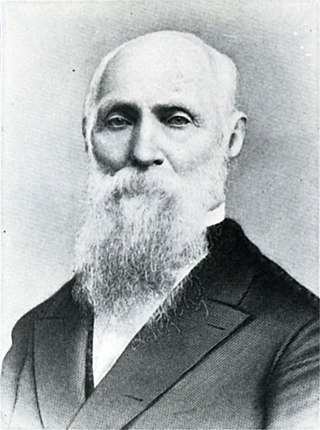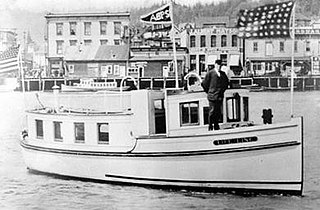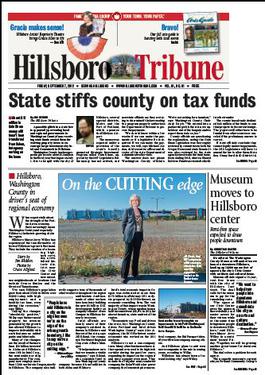
The Tualatin Valley is a farming and suburban region southwest of Portland, Oregon. The valley is formed by the meandering Tualatin River, a tributary of the Willamette River at the northwest corner of the Willamette Valley, east of the Northern Oregon Coast Range. Most of the valley is located within Washington County, separated from Portland by the Tualatin Mountains. Communities in the Tualatin Valley include Banks, Forest Grove, Cornelius, Hillsboro, Aloha, Beaverton, Sherwood, Tigard, and Tualatin.

Willamette Heritage Center is a museum in Salem, Oregon. The five-acre site features several structures listed on the National Register of Historic Places including the Thomas Kay woolen mill, the Jason Lee House, Methodist Parsonage, John D. Boon House, the Pleasant Grove (Condit) Church. The houses and church were relocated to the mill site. The Center also includes a research library and archives of Marion County history.

The Statesman Journal is the major daily newspaper published in Salem, Oregon, United States. Founded in 1851 as the Oregon Statesman, it later merged with the Capital Journal to form the current newspaper, the second-oldest in Oregon. The Statesman Journal is distributed in Salem, Keizer, and portions of the mid-Willamette Valley. The average weekday circulation was 27,859, with Sunday's readership listed at 36,323, in 2012.. It is owned, along with the neighboring Stayton Mail and Silverton Appeal Tribune, by the national Gannett Company.

The Klickitat are a Native American tribe of the Pacific Northwest. Today most Klickitat are enrolled in the federally recognized Confederated Tribes and Bands of the Yakama Nation, some are also part of the Confederated Tribes of the Grand Ronde Community of Oregon.

Alfred Evan Reames was an American attorney and politician from the state of Oregon. A native Oregonian, he served as a United States Senator for nine months in 1938. A Democrat, he practiced law in Portland, Eugene, and Jacksonville.
David Hill was an American pioneer and settler of what became Hillsboro, Oregon, United States. He served in the Provisional Government of Oregon in both the executive and legislative branches, and later as a legislator in the first Oregon Territorial Legislature. Hill made a transaction with the county court in 1850 that led to the renaming of Columbus to Hillsborough in honor of Hill.

Multnomah College, was a two-year, private college located in Portland in the U.S. state of Oregon. Established in 1897 as the Educational Department of the YMCA in downtown Portland, the school was the oldest fully accredited two-year college in the U.S. Pacific Northwest at the time it was absorbed by the University of Portland (UP) in 1969.

William Williams Chapman was an American politician and lawyer in Oregon and Iowa. He was born and raised in Virginia. He served as a United States Attorney in Iowa when it was part of the Michigan and Wisconsin territories, and then represented the Iowa Territory in the United States House of Representatives. He later immigrated to the Oregon Country, where he served in the Oregon Territorial Legislature.
The Beaverton Valley Times, also known as the Valley Times, is a weekly newspaper covering the city of Beaverton, Oregon, United States, and adjacent unincorporated areas in the northern part of the Tualatin Valley. Owned since 2000 by the Pamplin Media Group, the paper was established in 1921. Currently based in neighboring Portland, the Valley Times is printed each Thursday.

The Bulletin is a newspaper in Bend, Oregon, United States. The Bulletin is owned by EO Media Group.

Life-Line was a Baptist missionary boat used to conduct ministry work in the Coos Bay region of southwestern Oregon, United States, from 1914 to 1923.

Beyond Words Publishing is a book publishing company located in Portland, Oregon, United States. Founded in 1983, the company was unprofitable in its early years, though its works were award-winning. The privately owned company focuses on non-fiction titles in the New Age genre, but began as a publisher of coffee table books. Beyond Words has a national distribution agreement with Simon & Schuster's Altria Books imprint and has published works by John Gray, Masaru Emoto, and Rhonda Byrne, including her book The Secret.

The Portland Telegram was a daily newspaper serving Portland in the U.S. state of Oregon from 1877 until it was acquired by, and merged into, the Scripps-owned Portland News in 1931. The News had started out as the East Side News under secretive circumstances in 1906. The Telegram was a Democratic paper, despite its founder being a staunch Republican.
John Sellwood was a pioneer Episcopal minister who settled in the U.S. state of Oregon on a 321-acre (130 ha) donation land claim on the east bank of the Willamette River upstream from Portland.

The following published works deal with the cultural, political, economic, military, biographical and geologic history of pre-territorial Oregon, Oregon Territory and the State of Oregon.

The Hillsboro Tribune was a weekly newspaper that covered the city of Hillsboro in the U.S. state of Oregon and was published from 2012 to 2019. It was replaced in 2019 by a Hillsboro edition of the Forest Grove News-Times, a sister publication.
The Lincoln County Leader was a weekly American newspaper published in Toledo, Oregon from 1893 to 1987. The newspaper was originally published as a Democratic paper, but its party affiliation changed with the ownership. For many years the newspaper was the primary journal in Lincoln County.

Cowlitz was a shallow-draft sternwheeler built for service on the Cowlitz River in southwestern Washington State. The vessel also served on the Columbia River. Cowlitz was in service from 1917 until September 1931, when, not far from The Dalles, Oregon, it sank in the Columbia river in a storm.
Journalism in the U.S. state of Oregon had its origins from the American settlers of the Oregon Country in the 1840s. This was decades after explorers like Robert Gray and Lewis and Clark first arrived in the region, several months before the first newspaper was issued in neighboring California, and several years before the United States formally asserted control of the region by establishing the Oregon Territory.
















